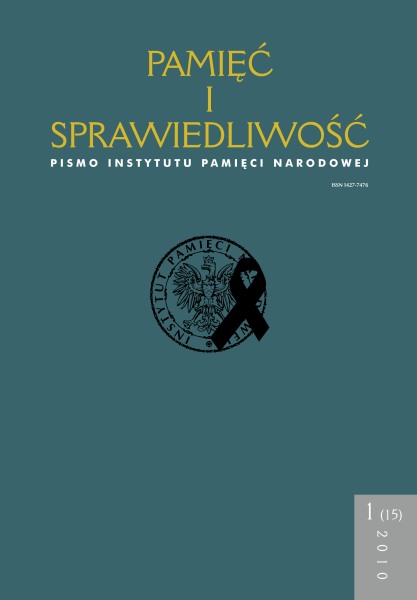Działalność Karola Lewkowicza – przyczynek do powstania orientacji prokrajowej na emigracji
Pamięć i Sprawiedliwość, Tom 15 Nr 1 (2010), strony: 139-169
Data publikacji: 2010-06-30
Abstrakt
New tactic of the PRL (the People’s Republic of Poland) authorities toward Polish emigration was initiated in the middle of 1950’s. The liberalization of the Communist system in Poland in 1956 and hopes for the “second stage” of the October; simultaneously - disappointment with the Western politics as well as constantly lessening chances to change a situation in Central and Eastern Europe and on the same breath, growing crisis and internal disunity of the emigration, created a fertile ground for pro-country orientation in exile. One of the form of communist diversion was offering financial support by the PRL’s intelligence
services to those communities which opted for collaboration with the country and which were fighting the „unbroken” off. A weekly “Odgłosy” (“Sounds”), than renamed “Oblicze Tygodnia” (“The face of the week”), edited by the former activist of the Polish Socialist Party – Karol Lewkowicz, was considered to be one of such “dirty” initiatives after the “October”. In January 1957, Lewkowicz, on his own initiative, came into contact with the
Polish embassy in London, where during the following talks, he suggested creating an all-party Polish organization in-exile (Kongres Polonii w Wielkiej Brytanii, The Polish Congress in Great Britain). He also highlighted a vital necessity for a new
pro-country paper-in-exile to be edited. Lewkowicz, acting on intelligence services’ order, was preparing reports covering information about not only a political situation in exile but also about personal characteristics of particular emigration activists. He was paid regularly for it in return. In the end of June 1957 the first issue of “Odgłosy” was published. The main purpose of publishing that weekly was to stop the press monopoly held by the „unbroken” and what is more it caused some kind of “crack” in the emigration’s environment so hostile to the PRL authorities. Ostensibly for being independent and having an autonomy, actually the “Odgłosy” popularized an idea of cooperation between the country and the exile. It also unmasked a “harmful” activity of the immigrants. By publicizing conflicts between particular groups and inside them, the editors sow confusion
and aggravated the breakdown of emigration. Lewkowicz stressed that after the October, the communist party in Poland was no longer a foreign agency. He also considered to be the only legitimate one the authority from the “Vistula country”. The Intelligence Service had grounds to suspect that Lewkowicz was also at British service, nevertheless the cooperation was continued. In 1966 the leadership of the MSW (the Ministry of Internal Affairs) finally decided to stop supporting financially
the “Oblicza Tygodnia” as a consequence of too high costs of its upkeeping. Moreover, the magazine was no longer the only pro-country paper in-exile.
Inne teksty tego samego autora
- Krzysztof Tarka, „Jest typem dość sympatycznym”. Józef Retinger i wywiad cywilny PRL , Pamięć i Sprawiedliwość: Tom 35 Nr 1 (2020)
- Antoni Józef Bohdanowicz, Władysław Bułhak, Andrzej Friszke, Małgorzata Ptasińska-Wójcik, Krzysztof Tarka, [Dyskusja] Stan badań nad emigracją i źródła do jej dziejów , Pamięć i Sprawiedliwość: Tom 15 Nr 1 (2010)
- Krzysztof Tarka, Nauka, polityka i tajne służby. Podróże Adama Bromkego do Polski , Pamięć i Sprawiedliwość: Tom 16 Nr 2 (2010)
- Krzysztof Tarka, Waldemar Sobczyk i „Nasz Znak” – dywersja w ruchu ludowym na emigracji , Pamięć i Sprawiedliwość: Tom 18 Nr 2 (2011)
- Krzysztof Tarka, Anna Cichocka, [Recenzja] Krzysztof Tarka, Emigracyjna dyplomacja. Polityka zagraniczna rządu RP na uchodźstwie 1945–1990, Oficyna Wydawnicza RYTM, Warszawa 2003, ss. 315 , Pamięć i Sprawiedliwość: Tom 6 Nr 2 (2004)
- Krzysztof Tarka, Reglamentowana odwilż. Obóz "zamkowy" na emigracji wobec wydarzeń w Polsce i bloku komunistycznym w 1956 roku , Pamięć i Sprawiedliwość: Tom 28 Nr 2 (2016)
- Krzysztof Tarka, Jest tylko jedna Polska. Bolesław Świderski – emigrant w służbie Polski Ludowej , Pamięć i Sprawiedliwość: Tom 11 Nr 1 (2007)
- Krzysztof Tarka, W oczekiwaniu na wyzwolenie. Rząd Rzeczypospolitej Polskiej na uchodźstwie o sytuacji międzynarodowej na przełomie lat czterdziestych i pięćdziesiątych , Pamięć i Sprawiedliwość: Tom 2 Nr 2 (2002)
 Język Polski
Język Polski
 English
English
 Deutsch
Deutsch
 Français (France)
Français (France)
 Italiano
Italiano
 Русский
Русский


 PDF
PDF
